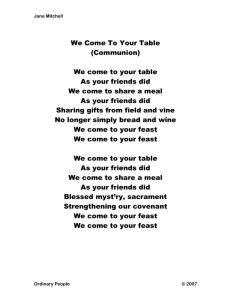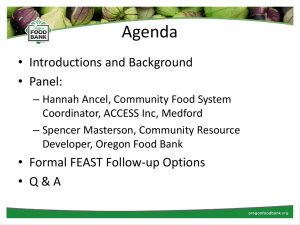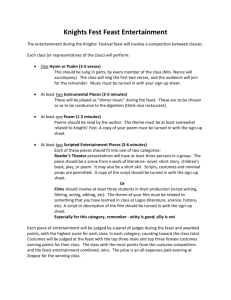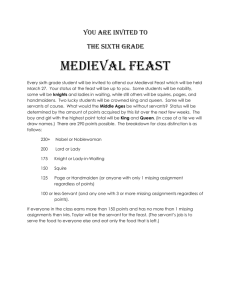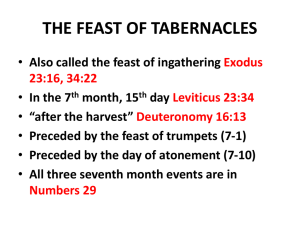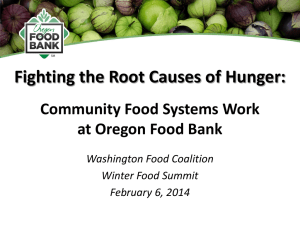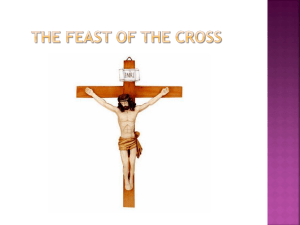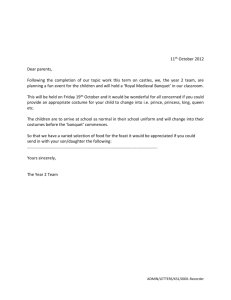How To Organise a Community Feast
advertisement
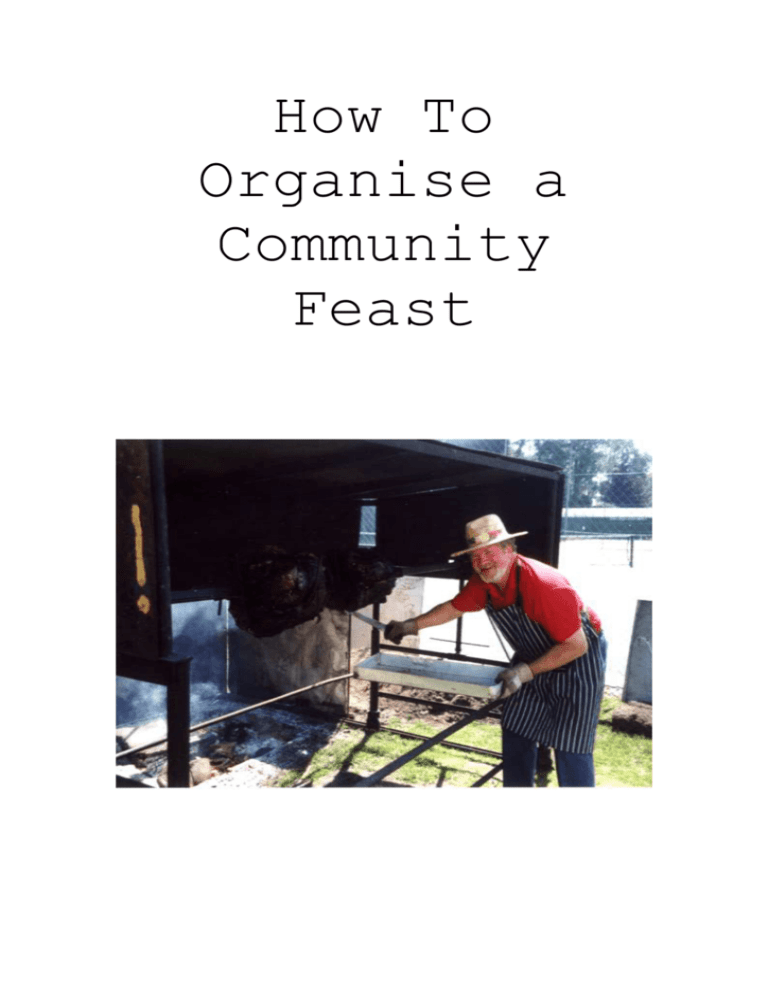
How To Organise a Community Feast by Duncan Grey for The Bunch Contents 1. Where Do I start? Questions to ask yourself first 2. Advertising and Ticket Sales 3. Arena Events 4. Keep an Eye on the Money. Financial Controls 5. Food 6. Drink 7. Security 8. Complementary Events 9. Organisers, helpers and workers 10. Evaluating What You’ve Done 11. Useful Lists A practical guide to bringing together your local community by feeding and entertaining them. Based on The Great Shelford Feast. In memory of Chris Mills, our onion man. 1952-2009 Where We Started From E ating, drinking and talking together is fun. Feasting like this in a community like a village or a group of streets in a town promotes a sense of community and well being which it’s hard to beat. A great example is the agricultural shows of Scotland which are important occasions for everyone, especially outlying farmers who will come in from the hills for one of the most important community events of the year, on a par with Hogmanay. If your community lacks a sense of togetherness then I can recommend organising a Feast. If it already has a sense of community then it’s just that bit easier. Whether you are focusing on a group of streets in a town, a number of small hamlets and outlying farms or an existing village, a Feast can do nothing but good. Lay on good food and gallons of drink, some entertainments, perhaps link it to some competitions, entertainments and local crafts and you have the beginnings of a recipe which can benefit everyone. Our experience is based on the village Feast at Great Shelford in Cambridgeshire, UK. Although the Feast goes back into mediaeval times it died out in 1939 until revived in 1994 - originally as a way of raising funds for the local primary school. That Feast was organised in just six weeks and was a roaring success, but it also had many weaknesses which we’ve tried to fix in the years since - and which has lead us to the formula we use today: still with weaknesses, always open to improvement, but which we hope you can learn from. While there’s nothing that can’t be improved, we’ve had great success with our arrangements and writing this will help us too. Just remember that while we refer at times to alternative ideas the main part of this book is based on our summertime outdoor Feast. While we suggest other ideas, and have seen them work elsewhere, our expertise lies mainly in our own Feast. Great Shelford is the larger village of the two Shelfords and has some 4000 people. There’s a school, two churches, three pubs, a garage, a library, a railway station, about twenty shops including two butchers, a post office and two banks. The recreation ground and the village hall are in the centre of the village and are run by the Parish Council and that’s where we hold the Feast on the third weekend in July. The people of Shelford may work in the village, in Cambridge which is only 4 miles away, or they may travel further afield - to London which is 50 miles away or anywhere in the south-east of England by way of a good network of roads and motorways. The pubs act as good meeting places for some, the churches for others. Many meet by way of the primary school, but there are few activities which involve everyone. The Shelford Feast is the main one of these. “The Bunch” which is the name given to the group of men who organise The Feast, is a curious mixture. It seems as if the only thing we have in common is The Feast, and it’s a constant surprise that we are still together after four years. Between us there’s a taxi driver, local broadcaster, wine expert, teacher, microbiologist, supermarket executive, genetics researcher, painter and decorator, carpenter, technician, builder, writer, quantity surveyor ... with other skills in computing, accountancy and pig sticking which have also proved useful. It’s perhaps in this patchwork of skills, which came together quite by chance, that we have our strengths. While we often think we’re well organised, we know we have to do better and this handbook is another step on the way to organising ourselves. I’ve included “Syd’s Slipups” to remind us all of some of the mistakes we made, or nearly made. There’s not one of us who, despite a year’s planning, couldn’t make the daftest and most basic error under pressure. Feedback How are we doing? If you do find this handbook useful we ask just one thing. Contact us at dsg@post.com and tell us how you got on. You might have comments or experiences we can gain from. You might have had a good time which we can celebrate too. Once you’ve joined the Feast community, life will never be the same again! Here’s to the next one! 1. Where do I start? Questions to ask yourself first • Why are we doing this? State your purpose clearly, it can help persuade participants and helpers alike and it might sharpen your thinking. • Is the priority aim to make money or to entertain? You should always aim to make some profit; don’t use “our aim is to entertain” as an excuse for failing to make money. Try to do both and make at least a little profit as a cushion against next time. Aim to make no profit and you’re bound to make a loss! “Making money for a good cause by entertaining” would seem to be a good balance. • Do you have a float to start with? Although you may arrange payment after you have counted the takings you will need some outlay before the event. You can minimise that by asking local traders to help out, borrow kit rather than buy it, subsidise it yourself as an act of faith... but your main contribution should be in organising it and doing the work, not paying for it! What if it goes wrong? Consider what is the worst that is likely to happen Consider what is the worst that could possibly happen How would you cope, financially and practically? Don’t take on too much! Cover yourself as far as possible. • Can you identify your market - numbers and preferences? Families, singles, pensioners, women, children ... they all have different requirements in terms of seating, timing, entertainment, food and drink - and you have to provide that if you are to be successful. If it’s to be a real community event you’d hope to do this in one place at one time, though there’s scope for additional targeted events too. • What are your advantages and strengths? Do A SWAT analysis. Play to your strengths. Are you organisers or practical people? Do you have sports facilities, a field in the centre of the village, a green bordered by houses, a large hall, wood, entertainers, sponsors .... • What are your disadvantages and weaknesses? Aim to minimise them by balancing with your strengths. Bring in a different kind of person, pay for equipment if you’re not practical, build things if you’re short of funds. • Can we rope off the whole site and should people pay to come in? Even if the aim is to bring the community in it’s not such a bad thing to ask people to pay to attend. They’ll appreciate it more and are unlikely to begrudge the money if they know it’s going to a good cause - their own community. Do we have enough space? You’ll need space to provide food, drink and entertainment plus room to move around in. There’s no easy way to calculate this but if in doubt ask a policeman or a school teacher. They’re used to visualising numbers of people milling around. Make the most of your space by designing a ground plan – placing marquees and shelters, entrances and exits, planning queues with tape or ropes and directing people to an arena if you have one. One thing’s for sure, if you have a mass of people you won’t be able to redesign the plan once they’ve arrived. Here’s the layout of our food tent. The main marquee is alongside to the left. Chefs at work The inevitable queues 2. Advertising and Ticket Sales dvertising should alert the community to the great event but should also aim to bring in people from elsewhere. I can’t imagine restricting the event to local folks only, though inevitably it will be those who come. The advertising should, however, point out that it is a local event - you’re not organising a rock concert for people from miles around, it should be rooted in the community wherever possible. A Paying on the door is one useful source of revenue as well as a way to check on attendance numbers - handy for next time. Another good wheeze is to sell raffle tickets or a lucky draw beforehand. There are also more elaborate schemes such as “guess the number plate” where the winner can win a car. these are organised by car sales teams and are underwritten by insurers. Such schemes allow you to bring in money before the event (adding to your float), are money spinners in themselves and they provide a dramatic moment for The Feast which keeps people there until the draw has taken place. Our Feast is typically on a Sunday from 12 to 6 and we hold the draw at about 5pm. Holding other events leading up to the Feast provide advertising in themselves and again allow you to sell tickets in advance. Tickets in advance mean money in advance and spread the load in order to limit failure due to bad weather on the day of The Feast itself. Decorating the surrounding area with bunting, flags etc or erecting a marquee several days ahead of time raises people’s awareness of the event and sends a message of activity to passers by. Photographs, stages or otherwise provide local media with good copy and the publicity generates yet more interest. If you have a theme, a message or a good cause - any angle which catches the attention, this will boost your morale and bring in the punters! A local personality to open the Feast is another attraction which generates its own publicity. Link this to a logo, or a classic picture of your event and the identity of your Feast will take shape. Selling programmes can be profitable. We print some good quality programmes with features about the origin of The Feast in mediaeval times, snippets of interesting information about local matters and about the person who is formally opening The Feast. Advertising from local businesses more than covers printing costs and the cover price of the programme generates income. Six programmes were printed with a special additional sentence hidden within the pages and the “lucky programme” winner was given a bottle of wine. Selling the programmes and raffle tickets up to a month ahead helped advertise the events and raised more advance money. Any money raised in advance is a great reassurance - especially if the weather is unreliable. You know it will offset your costs and you know people have paid even if they don’t turn up!


